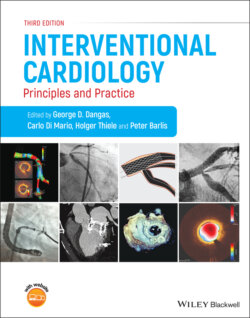Читать книгу Interventional Cardiology - Группа авторов - Страница 317
Primary PCI in the setting of cardiogenic shock
ОглавлениеThe early seminal study in the setting of cardiogenic shock was the Early Revascularisation in Acute Myocardial Infarction Complicated by Cardiogenic Shock (SHOCK) trial [36], published in 1999. This trial demonstrated that emergency revascularization (either PCI or coronary artery bypass grafting [CABG]) resulted in a significant reduction in mortality in the revascularization group (50.3% vs 63.1%; p = 0.027) at six months. Of note, the 30‐day follow‐up did not show a significant mortality difference. On further follow up, this mortality difference at six months was sustained at 12 months (53.3% vs 66.4%; p = 0.03),37 and 6 years (67.2% vs 80.4%; p = 0.03) [38].
There are no randomized controlled trials assessing the efficacy of PCI vs CABG in cardiogenic shock.
In 70–80% of cases of patients with ischemic cardiogenic shock, multivessel coronary disease is found on initial diagnostic angiogram [39]. The CULPRIT‐SHOCK study was designed to investigate whether PCI of the culprit‐lesion‐only, with the option of staged revascularization of the non‐culprit lesions, would result in better clinical outcomes than immediate multivessel PCI in the case of patients who present with multivessel coronary artery disease, acute MI and cardiogenic shock [40]. In summary, this was an investigator‐initiated, 1:1 randomized, open‐label multicenter trial including patients with acute STEMI or NSTEMI complicated by cardiogenic shock, with planned early revascularization by means of PCI and an identifiable culprit lesion. A total of 706 patients were randomized to the culprit‐lesion‐only PCI group (351 patients) or the multivessel PCI group (355 patients). At 30 days, the rate of the composite primary endpoint of death or renal‐replacement therapy (RRT) was significantly lower in the culprit‐lesion‐only PCI group than in the multivessel PCI group (45.9% vs 55.4%; relative risk, 0.83; 95% CI 0.71 to 0.96, p = 0.01). This was driven principally by increased rates of death in the multivessel PCI group, rather than an increased need for RRT. This finding led to a change in the recommendations in the updated ESC Revascularization guidelines with a down‐grading of immediate multivessel PCI to a class III B recommendation [22].
